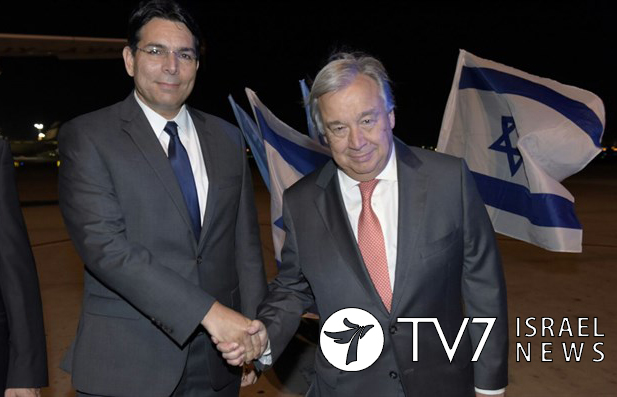United Nations Secretary-General António Guterres arrived last night for a first official visit to Israel and the Palestinian territories in the context of a broader trip to the Middle East. Upon arrival at the Ben Gurion international airport, Israeli Ambassador to the UN Danny Danon welcomed the Secretary General and said, “We are looking forward to showing Israel to you in the next number of days, an island of prosperity and stability in the stormy Middle East.”
As part of his visit, which is scheduled to last four days, the secretary general visited this morning the Yad Vashem Holocaust Memorial Museum and participated in a memorial ceremony in the Museum’s Hall of Remembrance to commemorate the six million Jews murdered during world war two. Following the ceremony, Guterres signed the Museum’s Guest Book, after which he met with a staff of experts from the international school for Holocaust Studies at Yad Vashem regarding an ongoing joint initiative aimed at “Keeping the Memory Alive” and dedicated to the world’s shared responsibility to assure that the atrocities of the holocaust will never happen again. Ahead of the Secretary General’s scheduled meetings with Israeli leaders, António Guterres visited Israel’s state cemetery on Mount Herzl, where he laid a wreath on the graves of former President Shimon Peres and that of Theodor Herzl, the visionary of the Jewish State.
Meanwhile, Prime Minister Benjamin Netanyahu welcomed Secretary General Guterres this afternoon at the Prime Minister’s Office in Jerusalem, for a first official meeting. During a closed-door meeting, Prime Minister Netanyahu urged the Secretary General to help muster international intervention to thwart Iran’s entrenchment in Syria and the smuggling of advanced weaponry from the war-torn-country to the Iranian-backed Hezbollah militia in Lebanon. Netanyahu also asked Guterres to support an Israeli request to oblige UNIFIL, which is the United Nations mission in Lebanon, to report any violations of UN Security Council Resolution 1701 to the Security Council, to assure that the Iranian backed forces operating in Israel’s northern neighbor would be subject to international scrutiny. At the moment, a resolution that would oblige UNIFIL to report violations to the UN Security Council is being obstructed by France, which is afraid that it might prompt Hezbollah to stage terror attacks against UNIFIL troops on patrol in southern Lebanon.
